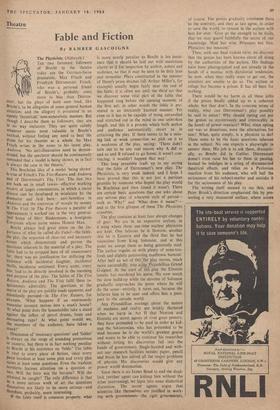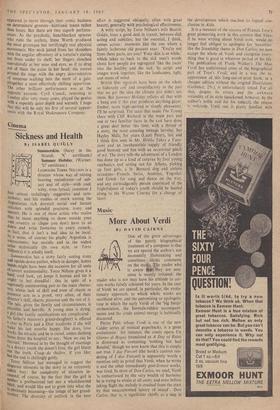Theatre
Fable and Fiction
By BAMBER GASCOIGNE The Physicists. (Aldwych.)
THE two foremost followers of Brecht in the theatre
today are the German-Swiss dramatists, Max Frisch and Friedrich Diirrenmatt. Frisch,
who was a personal friend of Brecht's, probably owes more to him than Diluen- t-nag, but the plays of both men tend, like Brecht's, to be allegories of some general human situation; and the allegory is presented in an openly 'theatrical,' non-naturalistic manner. But though I describe them as followers, they are in no way imitators. They use quite calmly whatever seems most valuable in Brecht's method, without feeling any need to beat the drum for his theories as a whole. So Max Frisch writes in the notes to his latest play, Andorra: `No anti-illusionism need be demon- strated, but the spectator should be continuously reminded that a model is being shown, as in fact Is always the case in the theatre.'
This Brechtian idea of a model 'being shown' Is true of Frisch's The Fire-Raisers and Andorra and of Diirrenmatt's The Visit. The last two are both set in small towns – effective working models of larger communities, in which a social disease can he developed in miniature by the dramatist and laid bare: anti-Semitism in 11. hdarra and the corrosion of morals by money In The Visit. In The Fire Raisers a parable of appeasement is worked out in the very general- ised home of Herr Biedermann, a bourgeois Everyman whose name means Honest Man.
Brecht always laid great stress on the im- portance of what he called die Fabel—the fable. the plot. the sequence of clear-cut and necessary scenes which demonstrate and pursue the questions inherent in the material of a play. The fable had to be stripped bare of all unnecessary fat; there was no justification for titillating the audience with incidental laughter, incidental thrills, incidental sentiment. Every scene, every hile, had to be directly involved in the meaning and purpose of the play. The fables of The Fire Raisers, Andorra and The Visit fulfil these re- quirements admirably. The questions at the centre of the play are quickly made apparent, and relentlessly pursued—in The Fire Raisers, for example, `What happens if an enormously muscular arsonist moves into a man's house? At what point does the householder take a stand against the influx of petrol drums, fuses and detonating caps? At what point would we, the members of the audience, have taken a stand?'
Discussion of `necessary questions' and 'fables' Is always on the verge of sounding pretentious or esoteric, but there is in fact nothing peculiar to Brecht in his insistence on 'fable.' The fable is vital to every piece of fiction, since every Piece involves at least some plot and every plot raises at least some questions. Even the trashiest novelette focuses attention on a question or two. Will the hero win the heroine? Will the criminal be caught? The only difference is that In a more serious work of art the questions themselves are likely to be more serious—and therefore, probably, more interesting.
If the fable itself is common property, what is more nearly peculiar to Brecht is his insist- ence that it should be laid out with maximum clarity as if for inspection by author, actors and audience, so that it may be seen to be duly lean and muscular. Plays constructed in the manner of Ibsen's prose dramas (all Arthur Miller's, for example) usually begin fairly near the end of the fable; it is often not until the third act that we discover some vital part of the fable that happened long before the opening moment of the first act; in other words the fable is pre- sented in an intricately knotted manner. Yet even so it has to be capable of being unravelled and stretched out in the mind in one unbroken length, and this is a process which both author and audience automatically resort to in criticising the play. If there seems to be a miss- ing link or weak connection we pick on it as a weakness of the play, saying: `There didn't turn out to be any real reason why A did so and so and B refused to go home; it wasn't con- vincing; it wouldn't happen that way.'
This long preamble leads up to my saying that the fable of Diirrenmatt's new play, The Physicists, is very weak indeed: and I hope
have proved that this is not just a partisan grumble by someone who hoped the play would be Brechtian and then found it wasn't. There
are certain basic questions that one asks about any serious play of whatever style of period— such as 'Why?' and 'What dues it mean?'— and at the first glimpse of these The Physicists crumbles.
The play contains at least four abrupt changes of gear. We are in an, expensive asylum, in a wing where three one-time nuclear physicists are kept. One believes he is Newton, another that he is Einstein and the third that he has visitations from King Solomon; and at this point we accept them as being genuinely mad. The author regales us with plenty of none-too- fresh and slightly patronising madhouse humour. After half an act of this'the play moves, much more successfully, into sortie Pirandellian Grand Guignol. At the start ofthe play the Einstein lunatic has murdered his nurse. We now watch the slow build-up while the devotee of Solomon gradually approaches the point where he will do the samc—entirely, it turns out, because she believes him to be sane and offers him a pass- port to the outside world.
Any Pirandellian musings about the nature of madness and reality are briskly shattered when we learn in Act II that Newton and Einstein are secret agents of rival great powers; they have pretended to be mad in order to kid- nap the Solomonian, who has pretended to be mad because he is the world's greatest genius and wants to be able to continue his researches without letting his discoveries fall into the hands of governments. Single-handed and with- out any research facilities besides paper, pencil and brain he has solved all the major problems of physics. His discoveries would give any power world domination.
Since there is no James Bond to end the dead- lock (neither agent can kidnap him without the other intervening), we lapse into some dialectical discussion. The secret agents argue that scientists like themselves are justified in work- ing with governments—the right governments, of course. The genius gradually convinces them to the contrary, and they at last agree, in order to save the world, to remain in the asylum with him for ever. 'Give us the strength to be fools, that we may guard faithfully the secret of our knowledge. Mad but wise. Prisoners but free. Physicists but innocent.'
Then, with one final violent twist, we discover that the genius has been known about all along by the authorities of the asylum. His findings have been photographed and are already in the hands of a maniac with dictatorial tendencies. So now, when they really want to get out, the scientists are unable to do so. The asylum or refuge has become a prison. It has all been for nothing.
There would be no harm in all these jerks if the pieces finally added up to a coherent whole; but they don't. In the concrete terms of reality, what can Diirrenmatt's play possibly be said to mean? Why should opting out put the genius so mysteriously and irrevocably in the hands of power maniacs? What, since opting out was so disastrous, were the alternatives for him? What. quite simply, is a physicist to do? These seem to be the basic questions inherent in the subject. No one expects a playwright to answer them. His job is to ask them. dramatic- ally, as Brecht did in Galileo. Dfirrenmatt doesn't even raise his hat to them in passing. Instead he indulges in a string of disconnected theatrical effects, and relies on a Pavlovian reaction from his audience, who will hail the seriousness of his subject-matter and mistake it for the seriousness of his play.
The writing itself seemed to me thin, and Peter Brook's direction emphasised this by pre- senting a very mannered surface, where actors appeared to move through their comic business on determinate grooves—histrionic trams rather than buses. But there are two superb perform ances. As the psychotic, hunchbacked spinster who runs the asylum, Irene Worth produced the most grotesque but terrifyingly real physical movements, Her neck jutted from her shoulders with the angular effrontery of a tortoise's staring out from under its shell; her fingers clenched convulsively at her nose and eyes, as if to drag out of them the pains in her head; she moved around the stage with the angry determination of someone walking into the teeth of a gale; altogether a most effectively chilling apparition. The other brilliant performance was at the apposite extreme. Cyril Cusack, returning to London after very many years, played the genius with a superbly quiet depth and warmth. I hope that this will be only his first of several appear- ances with the Royal Shakespeare Company.































 Previous page
Previous page